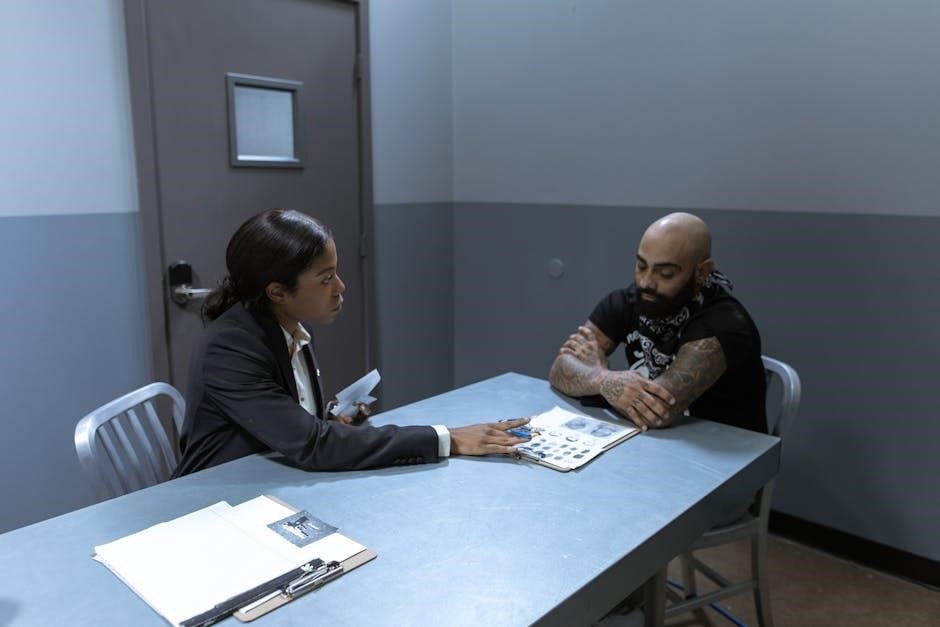
nurse interview questions and answers pdf
Common Nurse Interview Questions and Answers
Discover essential nursing interview questions and answers to prepare for your next interview. From strengths and weaknesses to patient care scenarios, get ready with proven responses.
- Why do you want to be a nurse?
- Describe a challenging patient care situation.
- How do you handle mistakes at work?
- What are your long-term career goals?
Honesty and accountability are key in your answers, showcasing your commitment to patient safety and professional growth.
Nurse interview questions are designed to assess your skills, experience, and fit for the role. Common questions often focus on clinical knowledge, patient care scenarios, and behavioral traits. Employers aim to evaluate your problem-solving abilities, communication skills, and commitment to the profession. Be prepared to discuss your strengths, weaknesses, and past experiences. Honesty and accountability are key, as they reflect your professionalism and patient-care priorities. Understanding these questions helps you tailor your responses to align with the employer’s expectations. Researching and practicing typical questions ensures confidence and readiness for your interview.
1.2. Most Frequently Asked Nursing Interview Questions
Common nursing interview questions often revolve around clinical expertise, patient care, and interpersonal skills. Expect inquiries like, “Why do you want to be a nurse?” or “Describe a challenging patient situation you managed.” Behavioral questions, such as “Tell me about a time you overcame a difficult obstacle,” are also prevalent. Employers may ask about your strengths and weaknesses, as well as your approach to teamwork and stress management. Additionally, questions about your long-term career goals and motivation for joining their facility are frequently posed. Being prepared to articulate clear, concise responses is crucial for making a positive impression.
1.3. Sample Answers to Nursing Interview Questions
When answering nursing interview questions, honesty and professionalism are key. For example, when asked, “Why do you want to be a nurse?” a strong response might be, “I am passionate about helping others and making a difference in patients’ lives.” For “Tell me about a time you overcame a challenge,” describe a specific situation, your actions, and the positive outcome. Highlighting teamwork, adaptability, and patient-centered care in your answers demonstrates your commitment to the profession. Tailor your responses to reflect your skills and experiences, ensuring they align with the facility’s values and mission.

Preparing for a Nursing Interview
Research the facility, review the job description, and practice common nursing interview questions. This preparation shows enthusiasm and readiness for the role and organization.
2.1. Researching the Healthcare Facility
Researching the healthcare facility is crucial for a successful nursing interview. Visit the facility’s website to review its mission, values, and services. Understanding the organization’s culture and goals helps align your answers with their priorities. Familiarize yourself with their patient population, common conditions treated, and any specialized programs. Review recent news or achievements to show your enthusiasm and knowledge. This preparation demonstrates your interest and readiness to contribute effectively. It also provides talking points for discussing how your skills and experiences match their needs.
- Explore the facility’s mission and values.
- Review patient demographics and services offered.
- Stay updated on recent news and achievements.

This research ensures you are well-informed and confident during the interview.
2.2. Understanding the Job Description
Understanding the job description is vital for a successful nursing interview. Review the responsibilities, qualifications, and skills required to align your experience with the role. Identify key areas like patient care, teamwork, and technical skills. This helps you prepare examples of how you’ve met similar expectations in previous roles. Pay attention to specific certifications or software mentioned, as these may be discussed. Matching your skills to the job description shows you’re a strong fit and prepared for the position. This alignment also helps you ask informed questions during the interview.
- Match your skills to the job requirements.
- Review specific certifications or software mentioned.
- Prepare examples of relevant experiences.
This preparation ensures you’re well-aligned with the role and ready to discuss your qualifications confidently.
2.3. Practicing Common Nursing Interview Questions
Practicing common nursing interview questions is crucial for confidence and clarity. Review frequently asked questions about patient care, teamwork, and problem-solving. Use resources like nursing interview guides or online forums to find examples. Practice answering behavioral questions using the STAR method (Situation, Task, Action, Result). Role-playing with a friend or mentor can simulate real interviews. Record your responses to identify areas for improvement. This preparation helps you articulate your experiences effectively, showcasing your skills and fit for the role. Regular practice ensures you’re ready to address any question posed during the interview with ease and professionalism.
- Use the STAR method for behavioral questions.
- Role-play with a mentor or friend.
- Record and review your responses.
Consistent practice enhances your ability to communicate your qualifications clearly and confidently.
Handling Challenging Nurse Interview Questions
Address challenging questions confidently by being honest about weaknesses and mistakes. Highlight lessons learned and how you’ve grown professionally. Prepare for behavioral questions using the STAR method to articulate your experiences clearly and effectively.
3.1. Questions About Weaknesses and Mistakes
When asked about weaknesses or mistakes, honesty and accountability are key. Acknowledge the situation, explain what you learned, and describe how you’ve improved. For example, if you struggled with time management, discuss how you implemented organizational tools to enhance efficiency. Frame mistakes as opportunities for growth, emphasizing patient safety and professionalism. Avoid clichés like “I’m a perfectionist” and instead provide a genuine, specific example. Show how you’ve taken responsibility and applied the lessons to your practice. This demonstrates maturity and a commitment to continuous improvement.
3.2. Behavioral Interview Questions in Nursing
Behavioral interview questions assess how you handle real-life situations. Examples include, “Describe a time you resolved a conflict with a colleague” or “Tell me about a challenging patient you cared for;” Use the STAR method (Situation, Task, Action, Result) to structure your answers. Be specific about your role, the actions you took, and the positive outcome. Highlight qualities like empathy, teamwork, and problem-solving. Show how you prioritized patient safety and well-being. These questions help employers gauge your nursing skills and how you handle stress in clinical settings. Always focus on positive outcomes and what you learned from the experience.
3.3. Salary Negotiation and Expectations
When discussing salary, be honest about your expectations while considering market rates and your experience. Research the average salary for your role to negotiate confidently. Mention your skills, certifications, and any unique qualifications that justify your request. For example, if asked about your expected salary range, provide a specific figure based on your research. Avoid being overly aggressive but show enthusiasm for the role. Employers appreciate transparency and may offer additional benefits like bonuses or flexible hours. Balance your financial goals with the workplace’s needs to reach a mutually beneficial agreement.
Creating a Strong Nurse Interview Portfolio
A strong portfolio includes certifications, licenses, letters of recommendation, and a detailed resume. Organize it neatly, ensuring easy access to your qualifications and achievements for interviewers to review.
4.1. What to Include in a Nursing Portfolio
Your nursing portfolio should showcase your qualifications, skills, and experiences. Include your resume, certifications, licenses, education transcripts, and letters of recommendation. Add clinical experience details, a skills checklist, and any awards or recognitions. Incorporate case studies or patient care examples, as well as projects or leadership initiatives. A personal statement outlining your career goals and motivation can provide insight into your aspirations. Organize these documents neatly, using sections or tabs for easy navigation, and ensure everything is up-to-date and professionally presented.

4.2. Tips for Organizing Your Portfolio
Organize your portfolio logically, starting with personal and professional information. Use clear sections or tabs for resumes, certifications, and licenses. Include a skills checklist and clinical experience details, supported by case studies or patient care examples. Add any awards, recognitions, or leadership projects to highlight your achievements. Use visuals like charts or graphs to present data effectively. Regularly update your portfolio to reflect new skills or experiences. Maintain consistency in formatting and ensure all documents are neatly presented. This structured approach will make your portfolio easy to navigate and professional, leaving a strong impression on interviewers.
4.3. Using a PDF Format for Easy Sharing
Using a PDF format for your portfolio ensures universal compatibility and professional presentation. Convert your portfolio into a PDF to maintain consistent formatting across all devices. This format is ideal for sharing via email or online platforms, making it easily accessible to hiring managers. Additionally, PDFs can be password-protected to secure sensitive information. Ensure the file is well-organized and concise, with clear sections for easy navigation. A PDF portfolio not only showcases your skills but also demonstrates your attention to detail and technological proficiency, leaving a strong impression on potential employers.

Final Tips for Acing Your Nursing Interview
Exude confidence, maintain eye contact, and smile. Show enthusiasm for the role and ask insightful questions. Follow up with a thank-you note to leave a lasting impression.
Key tips: Be prepared, stay positive, and highlight your passion for nursing.
Non-verbal cues matter: Use open body language and maintain a professional demeanor.
5.1. Understanding the Importance of Body Language
Body language plays a crucial role in nursing interviews, conveying confidence and professionalism. Maintain eye contact, sit upright, and smile to show enthusiasm. Open gestures and nodding demonstrate engagement, while avoiding crossed arms or fidgeting ensures a positive impression.
- Use confident postures to showcase self-assurance.
- Smile naturally to build rapport with interviewers.
- Avoid distracting movements that may divert attention.
Positive non-verbal cues enhance your credibility and leave a lasting impression, complementing your verbal responses effectively.
5.2. Asking the Right Questions During the Interview
Asking thoughtful questions during your nursing interview demonstrates engagement and preparation. Inquire about the unit’s culture, patient care philosophies, and professional development opportunities to show genuine interest.
- What is the typical patient-to-nurse ratio on this unit?
- How does the team handle high-stress situations?
- What opportunities are available for continuing education?
- How does the facility support work-life balance for nurses?
These questions highlight your commitment to delivering quality care and your desire to grow within the organization, leaving a positive impression on the interviewer.
5.3. Following Up After the Interview
A well-timed follow-up after your nursing interview can leave a lasting positive impression. Send a thank-you note within 24 hours, expressing gratitude for the opportunity and reiterating your interest in the position.
- Highlight a key discussion point to show engagement.
- Reaffirm your enthusiasm for the role and facility.
- Include any additional information requested during the interview.
This thoughtful gesture demonstrates professionalism and reinforces your candidacy. It also provides a polite reminder of your qualifications, helping you stand out to the hiring team.